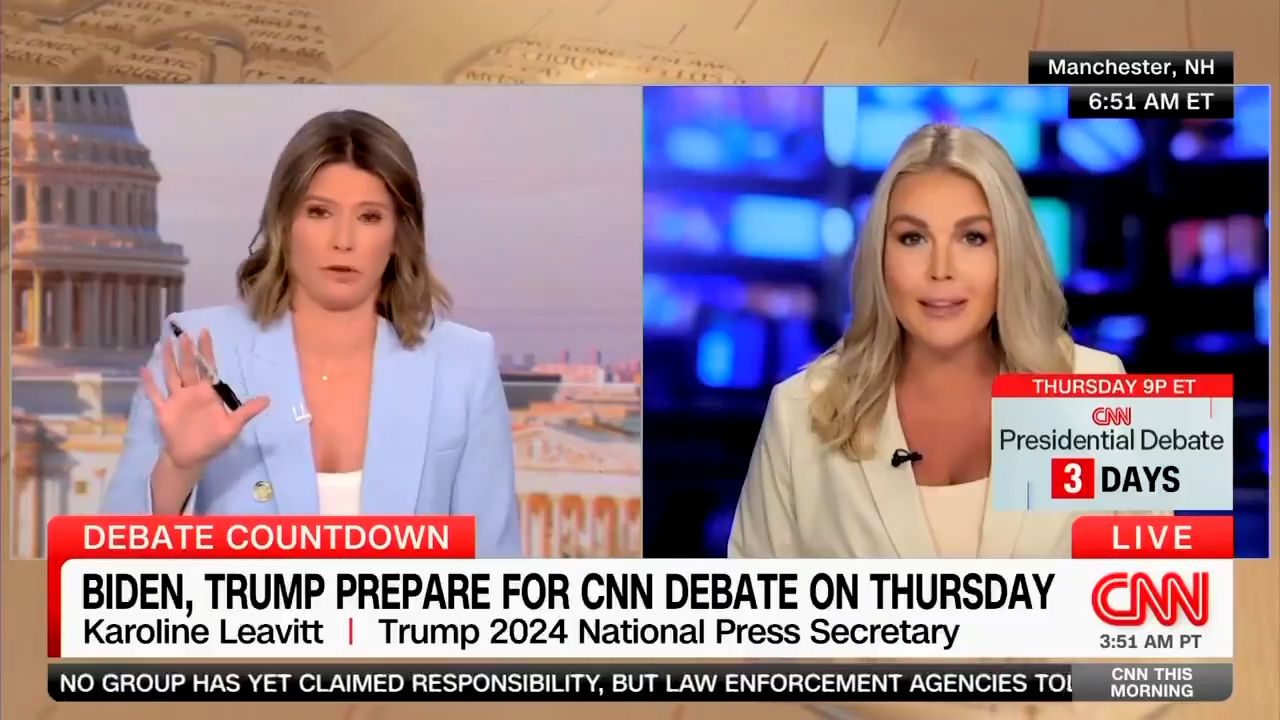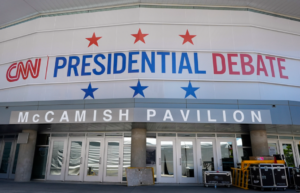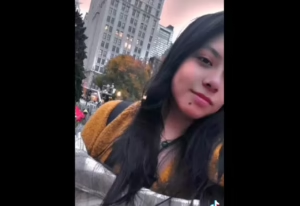In a contentious exchange emblematic of the ongoing friction between conservative figures and mainstream media, CNN abruptly terminated an interview with Karoline Leavitt, press secretary for former President Donald Trump, after she launched a pointed critique against CNN host Jake Tapper. The incident occurred during a live broadcast, sparking immediate reactions across the political spectrum.
Leavitt, appearing on CNN’s “State of the Union” with Kasie Hunt, was discussing Trump’s performance in a recent Republican primary debate. During the conversation, she veered into a harsh critique of Jake Tapper, accusing him of bias and unprofessionalism in his debate moderation. “Jake Tapper’s performance was a disgrace. He showed clear bias against President Trump, interrupting him repeatedly while giving his opponents a free pass,” Leavitt asserted.
Kasie Hunt, the host, swiftly intervened, attempting to steer the conversation back to the debate’s substantive issues. However, Leavitt persisted in her criticism, prompting Hunt to cut her off mid-sentence. “This interview is not the place for personal attacks on our colleagues,” Hunt declared before ending the segment.
The abrupt termination of the interview ignited a firestorm of commentary. Many conservative voices hailed Leavitt for her unapologetic stance and criticized CNN for what they perceived as censorship. “It’s clear that CNN cannot handle the truth when it comes to their bias,” commented a prominent conservative commentator on social media. “Karoline Leavitt spoke for many Americans who are tired of the mainstream media’s double standards.”
MAGA war room, a popular pro-Trump account on X, formerly Twitter, wrote: “CNN is afraid of people knowing the truth.”
Rich Zeoli, a Philadelphia radio presenter who has interviewed Trump in the past, said in a post on X: “Now that’s just rude, CNN. Throwing @kleavittnh off like that? Coward News Network?”
Conversely, supporters of CNN defended the network’s decision, arguing that Leavitt’s comments were inappropriate and detracted from meaningful political discourse. A media ethics expert noted, “Television interviews should focus on issues and policies, not personal attacks on journalists. CNN was right to maintain professional standards.”
Trending: Supreme Court Rules Against Automatic Residency for Noncitizen Spouses
Leavitt’s critique of Tapper centered on his moderation style during the debate, which featured leading Republican candidates. She argued that Tapper’s questions were unfairly framed and that his frequent interruptions of Trump displayed a clear bias. “Tapper’s conduct was unbefitting of a journalist. He should moderate with fairness and impartiality, but his disdain for President Trump was evident,” Leavitt said during the truncated interview.
Jake Tapper, a seasoned journalist with a long history at CNN, has often been a target of conservative criticism. His hard-hitting questioning and scrutiny of Trump and his administration have made him a polarizing figure. In response to the incident, Tapper’s colleagues have rallied around him, underscoring the importance of tough journalism in holding public figures accountable.
The clash between Leavitt and CNN underscores the broader tension between conservative figures and mainstream media outlets. Trump’s tenure in the White House was marked by frequent battles with the press, and this latest incident illustrates that the adversarial relationship continues.
Trump and his supporters have long accused outlets like CNN of harboring a liberal bias, while many in the media argue that their reporting is grounded in fact and necessary for democracy.
Leavitt’s comments resonate with a substantial portion of the Republican base, who feel marginalized and misrepresented by mainstream media. This sentiment has fueled alternative conservative media platforms that claim to offer more balanced coverage.
The termination of the interview may further entrench these divides, as conservatives rally against what they see as an unfair media landscape.
Despite the controversy, the focus on media bias may distract from more substantive discussions on policy and governance. The Republican primary debate covered a range of critical issues, from the economy to foreign policy. However, the fallout from Leavitt’s interview threatens to overshadow these important topics, reducing the public discourse to a clash over media conduct.
As the 2024 election cycle intensifies, such confrontations between conservative figures and mainstream media are likely to continue. The incident involving Karoline Leavitt and CNN exemplifies the polarized media environment and the challenges of maintaining civil discourse in a highly charged political climate. Whether this will lead to a broader reckoning within the media or deepen existing divisions remains to be seen.
About The Author
Eric Thompson
Eric Thompson is a former US Marine, husband, father, follower of Christ, show host, opinion writer and a good driver based in Oklahoma.




